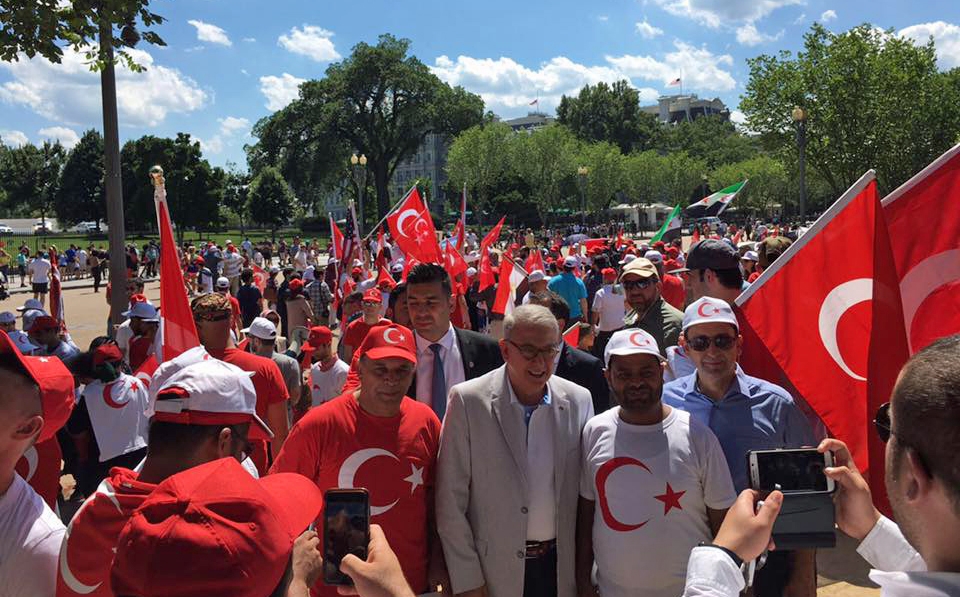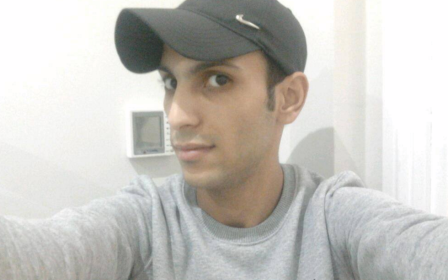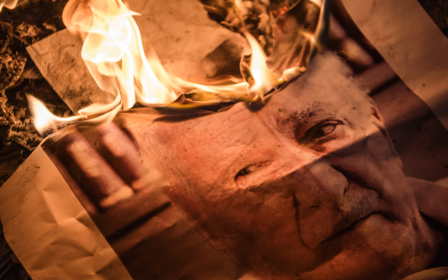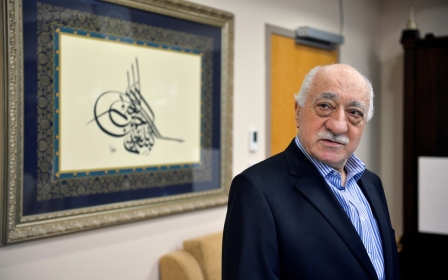Gulen extradition fight widens rifts among Turkish Americans

NEW YORK - Hundreds of demonstrators waved red Turkish flags outside the White House on Sunday, the latest in a string of anti-coup protests staged by a Turkish-American community that is growing ever-more divided over the US-based Muslim cleric, Fethullah Gulen.
With Turkey poised to ask the US to extradite Gulen over last month’s failed putsch, tensions between Turkish Americans are heating up as members of a typically calm community are riven by religion, geopolitics and personal loyalties.
Ridvan Sezer was still pumped up from an anti-Gulen rally in his home city of New York when he spoke with Middle East Eye. Gulen’s days of being a puppet master from a leafy Pennsylvania compound are numbered, the website boss said.
“Since the attempted coup, Turkish Americans have gathered together. Whether they like Turkey’s president or not, they support him right now," Sezer told MEE. "Why? Because we the saw real face of Gulen, how dangerous this guy and his cult is."
United against coup
“There is no way anybody will follow him anymore. We want him sent back to Turkey and face justice for what he done. Turkish Americans and everybody in the world knows there is no place in democracy for a military coup.”
Sezer’s criticism was echoed by other Turkish Americans, who have rallied in street protests across major US cities since a 15 July attempted coup that claimed the lives of more than 230 people in Turkey, not including the rebel troops involved.
On Sunday, in support of a million-strong protest in Istanbul, Turkish Americans wearing red and holding Turkey’s flag, with its white star and crescent, gathered in Washington and called on US President Barack Obama to deport Gulen, 77, to Turkey.
Their community, estimated to be as large as half a million people, and concentrated in New York, Boston, Washington, Chicago, Houston, Los Angeles and other big cities, has long been watchful of Gulen’s organisation.
But many Turkish Americans are Gulenists or are linked to his work: his charter schools, the Hizmet movement, which means “service” in Turkish, the Alliance for Shared Values and the Turkic American Alliance – umbrella bodies for hundreds of groups across the US.
Officials from Gulen’s organisation declined MEE’s interview requests. Members of more secular Turkish-American groups – many of which have denounced the coup and called for Gulen’s deportation – were keener to go on the record.
Ibrahim Uyar, from the Turkish American National Steering Committee (TASC), said he represents more than 150 community groups across the US, which overwhelmingly reject the failed coup and pin the blame on Gulen.
“This group has a hidden agenda and their own ideology, using tolerant western values to establish their own goal, like [Ayatollah] Khomeini did in Iran,” Uyar told MEE. “We believe the US should recognise Gulen’s group as a terrorist organisation.”
Washington on quick dial
According to Yenal Kucuker, a programme manager for the Turkish Heritage Organisation, Gulen has built up an effective operation in the US – a nationwide web of followers armed with cash and the cell phone numbers of decision-makers in Washington.
“Every time I meet a government official, they’ve already had visits from Gulen’s movement,” said Kucuker, while praising their military-like efficiency. “They’re very effective in grassroots activism and being engaged.”
Individuals and groups linked to Gulen’s movement have donated big sums to political campaigns, including those of Democratic presidential nominee Hillary Clinton and Senate Majority Leader Mitch McConnell, a Republican, among others, according to federal filings.
This past decade, more than a dozen Gulen-linked groups have also sponsored 289 congressional trips, nearly half of all congressional visits to Turkey during that period, according to a study of those filings by The Washington Post newspaper.
But the success of the movement has irked members of secular Turkish American groups, including those under the umbrella of the Assembly of Turkish American Associations (ATAA), which are often outflanked by Gulen’s better-funded outfits, Kucuker said.
Gulen-linked groups have been unwilling to cooperate with the ATAA – even when they share a common purpose, such as countering claims that atrocities against Armenians in the early 20th Century constituted genocide, Kucuker added.
A simmering resentment existed between the two camps, he continued. The failed coup turned up the heat, and relations between US-based Gulenists and other Turkish Americans have grown ever-more abrasive.
Protests against Gulen
Anti-Gulen protestors have rallied outside his compound in the Pocono Mountains of eastern Pennsylvania and other sites, taken out adverts in newspapers and written letters calling on their congressmen to act.
An online petition that urges the White House to “stop providing a safe haven” to Gulen and deliver him to America’s “most dependable and long-time ally in the Middle East” looked likely to get the required 100,000 signatures needed to warrant an official response.
According to Kucuker, perceived ties between Clinton and Gulen could hurt her chances with Turkish-American voters in November’s presidential poll. Donald Trump, her Republican rival, may benefit, given his support for Erdogan-style strongmen.
Perceived ties between Clinton and Gulen could hurt her chances with Turkish-American voters in November
Gulen, who has lived in self-imposed exile in the US since 1999, denies plotting against Turkey and has condemned the putsch, in which rogue soldiers used tanks, warplanes and helicopters to bomb parliament and seize bridges in a power grab.
Turkish President Tayyip Erdogan has accused Gulen of harnessing a network of schools, charities and businesses, built up in Turkey and abroad over decades, to infiltrate state institutions and build a “parallel structure” that aimed to take over the country.
More than 60,000 people in the military, judiciary, civil service and education have been detained, suspended or placed under inquiry for alleged links to Gulen’s "Hizmet" movement since the coup, prompting fears among rights groups and Western allies of a witch hunt.
Gulen and the Erdogan-led Justice and Development Party were staunch allies until 2013, when they turned on each other after alleged Gulen followers in the judiciary and police launched a corruption probe against Erdogan’s inner circle.
Turkey, a vital NATO ally in the fight against Islamic State (IS) militants, has sent a delegation to the US and urged Washington to hand over Gulen. A formal extradition request is expected. US officials said Ankara must provide evidence of Gulen’s wrongdoing.
Turkey and the US are bound by an extradition treaty that came into force in 1981, and the two countries must satisfy a series of legal procedures and meet evidential standards before any official extradition request is granted.
US Secretary of State John Kerry is expected to visit Turkey on August 24.
New MEE newsletter: Jerusalem Dispatch
Sign up to get the latest insights and analysis on Israel-Palestine, alongside Turkey Unpacked and other MEE newsletters
Middle East Eye delivers independent and unrivalled coverage and analysis of the Middle East, North Africa and beyond. To learn more about republishing this content and the associated fees, please fill out this form. More about MEE can be found here.




